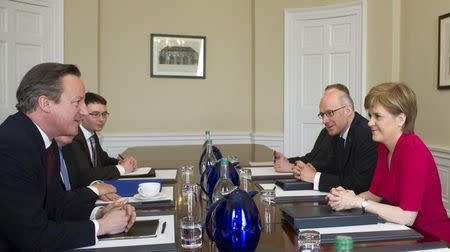UK's Cameron says second Scotland referendum 'not remotely on the cards'

By Alistair Smout EDINBURGH (Reuters) - British Prime Minister David Cameron said on Friday a second Scottish independence referendum was "not remotely on the cards", but he would consider nationalist demands for greater powers to be devolved from London to Scotland. Cameron was speaking after meeting Scotland's secessionist leader Nicola Sturgeon in Edinburgh, the Scottish capital, just over a week after her Scottish National Party (SNP) won almost every seat in Scotland in the general election, straining Britain's unity nine months after a referendum saved it. Scots rejected independence last year by 55-45 percent, and asked whether he would veto another such referendum, Cameron told the BBC: "I don't think it's remotely on the cards." "I'm very clear: we had a referendum, it had a decisive outcome. The choice now is what sort of future for Scotland in the United Kingdom." Basking in the afterglow of her party's stunning victory last week when it won 56 of 59 Scottish seats in the United Kingdom's parliament, Sturgeon used the meeting to tell Cameron she wanted him to go well beyond an existing deal to grant more powers to the devolved Scottish government. Although Cameron's Conservatives performed strongly in England and won an overall UK-wide majority, they won just one seat in Scotland. Cameron had already agreed to further dismantle Britain's highly centralised system of government and to give Scotland, which already enjoys a large degree of autonomy, new tax-raising powers. EU CHOICE But Sturgeon said she'd told Cameron she wanted him to go well beyond a deal reached last year after a process known as the Smith Commission. "I have said that we will put forward proposals for devolution further than the Smith Commission proposals," she told Sky News after the meeting, saying Scotland wanted a greater say over business taxes, employment legislation, the minimum wage and welfare payments. Cameron said he would look at the proposals, but made no promises he would agree to them. He said he was opposed to granting Scotland full fiscal autonomy, something the SNP is pushing for. The SNP argues its victory last week shows Scottish voters have decisively rejected public spending cuts imposed by Cameron's Conservatives. Sturgeon argues that any future settlement must give Scotland the power to pursue the less austere policies Scottish voters demand. Cameron, a distant cousin of Queen Elizabeth, is as clear that he doesn't want to preside over the collapse of the United Kingdom as Sturgeon, daughter of a Scottish electrician, is clear that she still wants independence one day. Scotland's three-centuries-old union with England could depend on the fate of another: Cameron has promised to renegotiate Britain's relationship with the European Union and hold an in-or-out EU membership referendum by the end of 2017. Sturgeon has said that if England voted to leave the EU but Scotland voted to stay, it could trigger another referendum on Scottish independence. The SNP is due to face Scottish voters once again in an election for the Scottish parliament next year. Some voters say Sturgeon's new mandate means she has no excuse if she fails to deliver on her promises. (Additional reporting by Stephen Addison; Writing by Andrew Osborn and Guy Faulconbridge; Editing by Robin Pomeroy)

